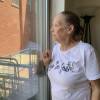Although Boston officials began the process of removing encampments around the Mass and Cass area Monday morning, it wasn't apparent walking around Atkinson and Southampton Streets that afternoon.
Workers began preparing people living in encampments near the intersection of Massachusetts Avenue and Melnea Cass Boulevard Monday, commonly known as Mass and Cass, to gather their belongings and move out of the area in accordance with an executive order from Acting Mayor Kim Janey. Tents and temporary shelters are no longer allowed on public ways in the city, a move aimed at combating what officials call a "public health crisis" posed by the structures.
But Monday saw no mass exodus. What looked to be dozens of tents and other makeshift accommodations lined the streets Monday afternoon, sometimes completely overtaking sidewalks and forcing pedestrians into close quarters with traffic.
As Boston develops procedures to fully implement the new executive order, city employees will be posting notices where tents have to be removed, according to a city spokesperson, adding that no person will be asked to move their tent without first being offered shelter.
It's clear that the city's plan will be no easy process. For Janey's part, she has emphasized that the process of clearing Mass and Cass should center on treating people with dignity, giving appropriate notice and opportunity for people to remove their shelters and, among other guidelines, not criminalizing the status of being an unsheltered individual, an individual with a substance use disorder or an individual with mental illness.
"The last thing any of us want to do is to revictimize or traumatize individuals who are in need of support and services," she told reporters Monday.
Part of the effort has come from shelter providers, who are setting aside beds for people who are coming in. Pine Street Inn President & Executive Director Lyndia Downie told GBH News that there's no perfect path to combatting the homelessness and addiction issues at Mass and Cass.
"We need to throw as many things on the wall and see what sticks and what will work for people, because there's no perfect system out there for this level of addiction and complexity around the health care issues, the public safety issues, the public health issues and the housing issues," she said.
Downie said the city is trying hard to balance harm reduction with public safety and public health. And while there's been a steady stream of criticism of Janey's plan, Downie pointed out that if there was already sufficient support, then people wouldn't be on Mass and Cass in the first place.
"And so I think we're all trying to look at, systemically, you have to do two things: you have to work with people on a one-on-one basis and help them find a path. And then you have to strategically work on 'what is the system we want?' You’ve got to do both," she said.
Although GBH News couldn't get anyone to talk on the record at Mass and Cass Monday, there didn't appear to be a general sense of urgency around what the city is going to do in the days to come.
One man, Ronald Geddes, told NBC10 Boston that he doesn't want to be there, but also doesn't want to go to a shelter.
"I don't want to live on the streets, I don't want to live in a tent, I want to live in a house like everybody else," he said.







